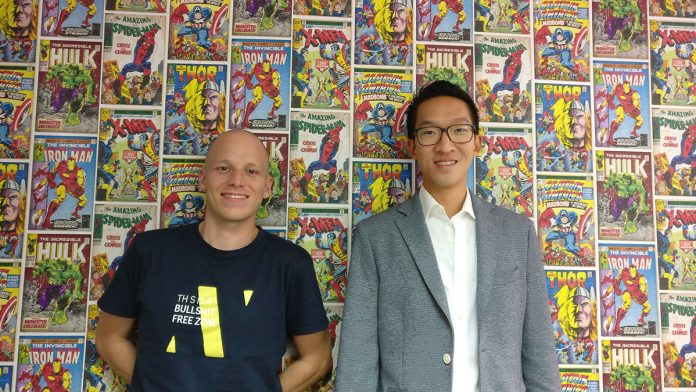In a special interview with Open Access Government, Justin Wu from Etherify sheds light on the firm’s role as a leader in Portugal’s exciting blockchain revolution
Etherify is the first Ethereum consulting and software development firm in Portugal. Etherify was started in April 2017 by two young entrepreneurs: Justin Wu and Fernando Moreira. Since then the firm has grown to become a leader in the blockchain revolution in Portugal. With projects ranging from commercial banking, the charity fundraising industry and video-games, Etherify’s CEO Justin Wu sat down with Open Access Government (OAG) to discuss his experience.
OAG: Where did the idea of Etherify come from?
JW: I’ve been involved in cryptocurrency in one way or another since 2013, during the first big Bitcoin bull-run. Although it was exciting to watch the price action, I was also very interested in the technology behind Bitcoin: the blockchain. When Ethereum came out in 2014 and had a programmable blockchain with its own programming language, I knew that I had found something special. It was like catching a glimpse of the future. Programmable money! Now that’s an amazing idea. I knew I had to be a part of this, so I began studying it in my free time. Then in late 2016 I met my partner Fernando, who runs a start-up incubator in Lisbon, and Etherify took off from there.
OAG: Why did you choose Portugal, of all places, to start your business?
JW: Portugal has an incredible entrepreneurial spirit and a heart for innovation. I came here several years ago at the bottom of the economic crisis in the country and I saw many people who were down on their luck. But then entrepreneurs took it upon themselves to create a renaissance in the city and redefine what it means to do business here in Portugal. I think Ethereum is a sort of force multiplier for start-ups, because it allows them to compete with larger incumbents in ways that they couldn’t before.
A great example is funding. Nowadays, a start-up can do an Initial Coin Offering (ICO) and get funding for their idea or to bring their prototype to finished product and then to market. Before these start-ups would have to go to VCs and the process was much harder and you’d have to give up equity. Etherify wants to help other Portuguese start-ups get funding through ICOs and/or use Ethereum to help them both compete and innovate.
From a regulatory standpoint, the Portuguese government has started initiatives to help both start-ups and fintech firms. We at Etherify are pushing to get blockchain recognised as a huge untapped business opportunity for the country on the national level. We are a member of Associação Fintech e Insuretech Portugal (AFIP) and we helped to organise the Blockspot Conference, the first international blockchain conference based in Lisbon, Portugal.
OAG: Why did you choose Ethereum as your focus, why not other blockchain platforms?
JW: For us, Ethereum is the most flexible blockchain to use. From a development standpoint, Ethereum has the most developers and developer tools out there of any blockchain ecosystem currently available, so it is the best for a firm such as us. Ethereum has the most network effects as well, indeed it handles more transactions per day than all other blockchains combined, including Bitcoin. At the enterprise level you have many Fortune 500 companies joining the Enterprise Ethereum Alliance, so I think we are in good company.
OAG: Why not just use Bitcoin, for example?
JW: Ethereum will very soon become the #1 cryptocurrency in terms of market cap. It already is #1 in developers and developer mind-share. This is important because everyone nowadays is talking about Bitcoin. But it is just a matter of time before Ethereum overtakes it in price and this is important to have as the leader in the cryptocurrency space, a platform that actually cares about things like scaling, decentralisation and privacy.
Bitcoin is like a pocket calculator. It is only good for one thing: moving value from one person to another. Ethereum is like a brand-new smartphone. Developers can create any type of application for Ethereum for any use case. The programming language for Ethereum called Solidity is much more flexible, useful and easier to learn that Bitcoin’s programming language. There is much more developer support and documentation for Ethereum developers than for Bitcoin, in my opinion.
Scaling the network is a huge issue too. Currently, no blockchain technology can scale to the level where it is ready to handle the transaction demands of the entire human race. Only Ethereum has scaling solutions in development and ready to both test and deploy in the early part of 2018. Bitcoin currently has no viable scaling solution and their leadership is questionable, at best.
Ethereum’s core developers are unified behind their leader Vitalik Buterin on Ethereum’s scaling vision. Currently, Ethereum can handle around 20 transactions per second. To get on the level of Visa/Mastercard, Ethereum would have to increase this to at least 4,000-5,000 transactions per second.
Network upgrades to Ethereum such as Proof of Stake, Raiden and Sharding would allow Ethereum to surpass these transaction capacities. These upgrades are all slated to come out during 2018.
OAG: Can you tell us about some of the projects you are working on?
JW: We have two ICOs in the pipeline right now: Gamestatix and Hustle for Humanity.
Gamestatix is going to do to the video-games industry what AirBnB did to hotels. The video-games industry has two fundamental problems: discoverability and lack of robust incentives for co-creation of video-games.
The discoverability issue is the major problem. Big game studios dominate the charts time and time again because they just release further iterations of the same game franchise. Thus, you have Battlefield 4, Final Fantasy 17, etc. etc. Newer game studios and franchises can’t break into the public consciousness because these incumbents have millions of dollars to market and stay on the top.
Gamestatix is creating a token that will be rewarded to gamers for playtesting new video games, from early-stage development and for being an active member of that game’s community. Gamers are also rewarded for both creating and curating content. So, we are tackling the two big problems in the video-game industry, with our token and platform.
Hustle for Humanity is a fantastic project in that it aims to disrupt the for-profit charity fundraising business. And it is a business. Did you know that many charity fundraising firms routinely keep up to 80% of the funds raised through them, only leaving 20% to go to the charity? Some fundraising firms even lose money. We think that is very unfair and we want to cut out the middleman in charity fundraising using blockchain technology and a unique incentive structure.
OAG: Sounds interesting. But many people are asking, ‘are cryptocurrencies in a bubble’?
JW: Absolutely not. What we are witnessing is the birth of a new asset class that I believe will grow to dominate both the economy and finance over the coming years. I’ll tell you what the real bubble is: The Federal Reserve and other central banks printing money out of thin air like there is no tomorrow. These people are imposing a hidden tax on the public, which is to erode their spending power over time. People are buying into Ether and other cryptocurrencies, because they want to preserve their purchasing power and even see it grow. The supply of cryptocurrencies cannot be artificially inflated by some bureaucrat. The rules are set by code, decentralised consensus and mathematics.
The key to first-time investors is to choose the right projects to invest in and avoid the others like the plague. Ethereum (ETH) is the best bet, in my view. Of course, I am biased, but if you do your research you can see that of the Top 100 coins on Coin Market Cap, 88 of them are based on Ethereum, or are Ethereum itself. The Enterprise Ethereum Alliance is the biggest blockchain consortium in the world and counts among its members Microsoft, JP Morgan, Reuters and the CME, to name a few.
Lastly and this is important, beware of scams and keep yourself safe. Always use a hardware wallet like a Ledger Nano S and buy from their official website. What I’m saying is not investment advice and you have to do your own research and due diligence. Please be careful out there.
OAG: What’s in it for the future of Etherify?
JW: The future is bright for Etherify. We are planning on launching our ICO projects and expanding to hire more people and to be a part of the emerging start-up and blockchain scene in Portugal. Please check out our website at http://www.etherify.io/ to discover more.
Please note: this is a commercial profile
Justin Wu
Etherify
Tel: +351 967 461 477











